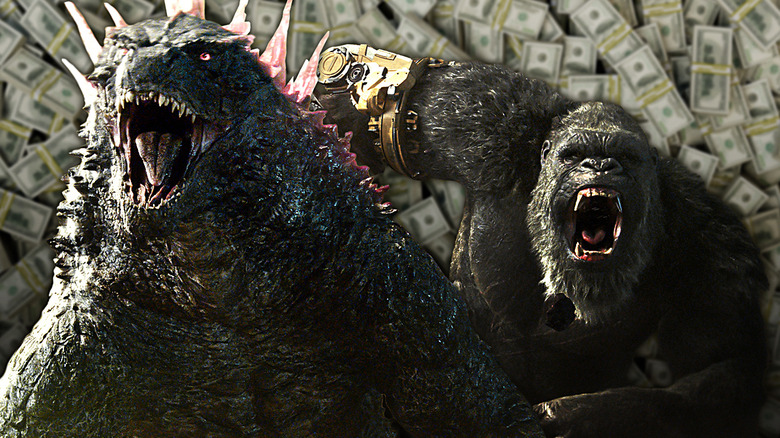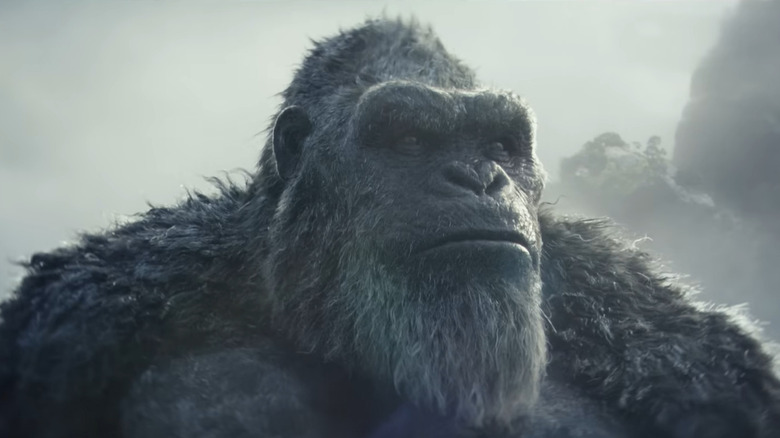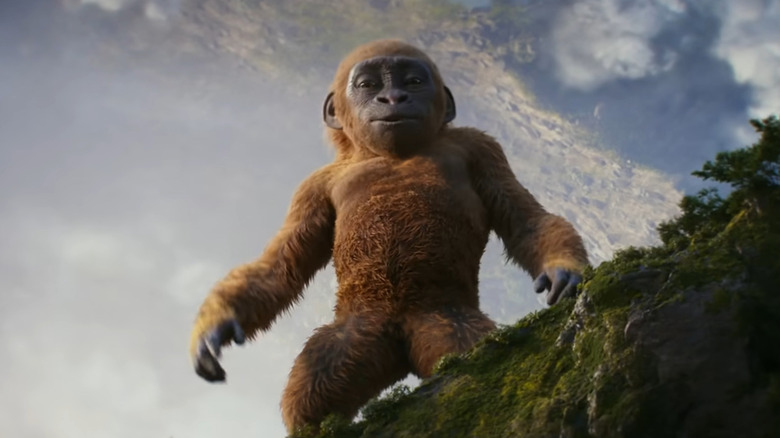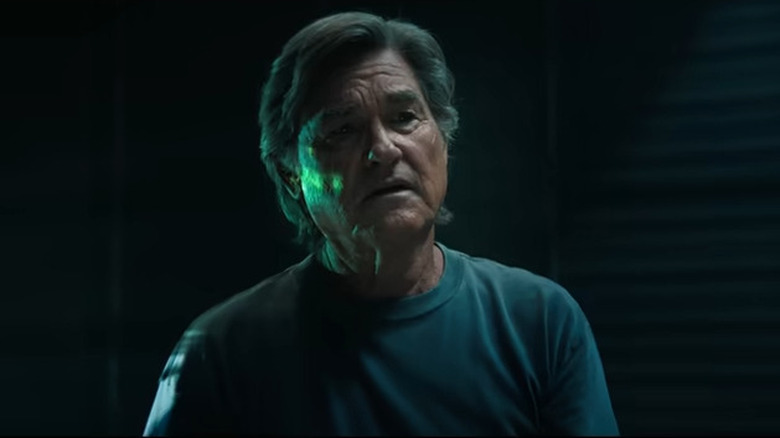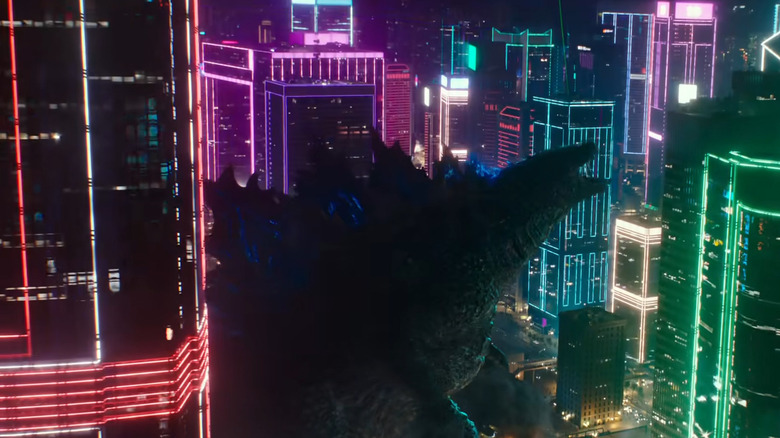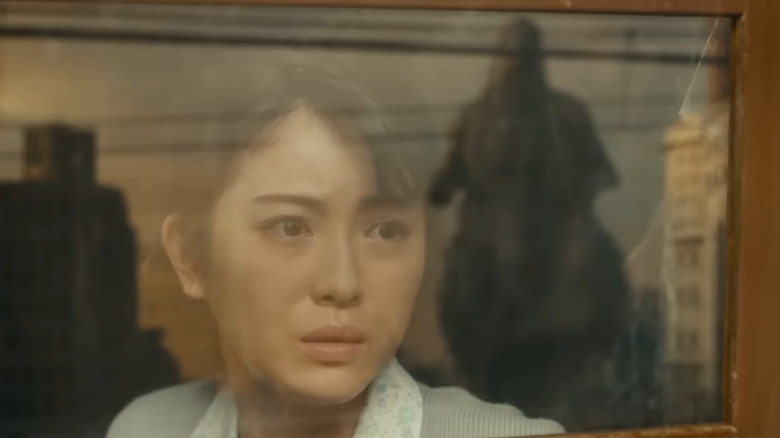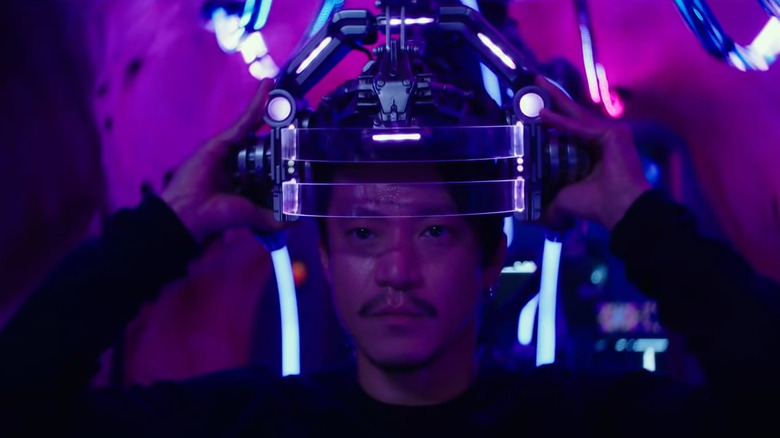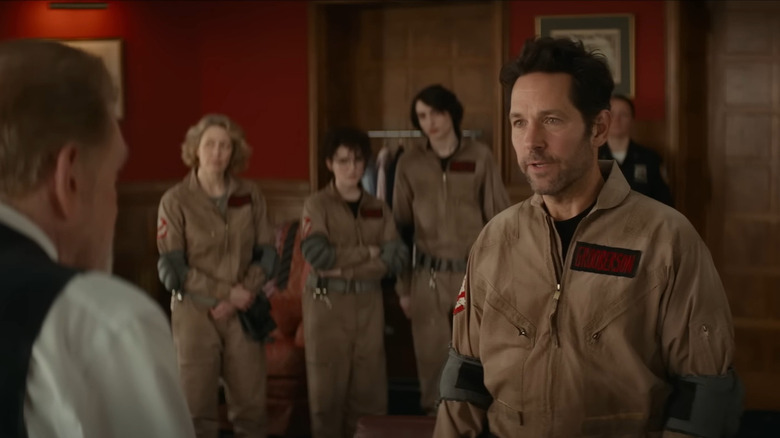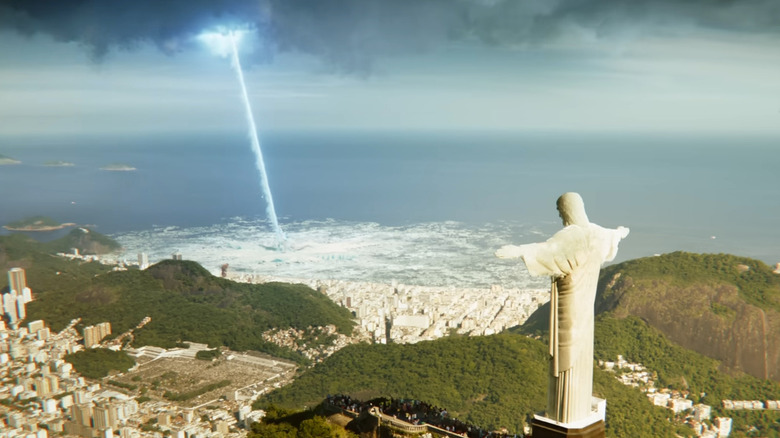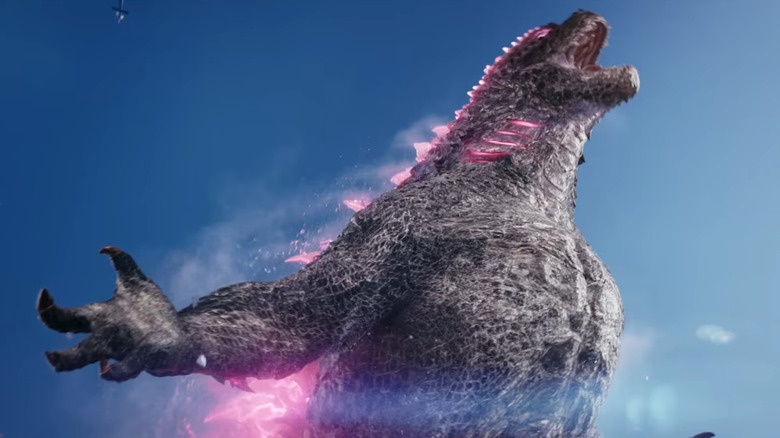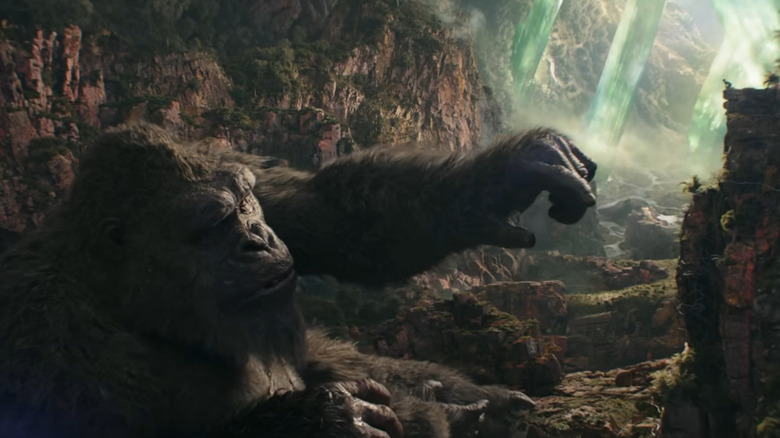Why Godzilla X Kong: The New Empire Blew Everyone Away At The Box Office
Warner Bros. and Legendary Entertainment's MonsterVerse has reemerged from the depths once more to deliver yet another commercial hit with "Godzilla x Kong: The New Empire." The big-budget CG spectacle debuted in the U.S. on March 29, 2024, raking in a staggering opening box office haul that only continues getting more impressive as its theatrical run continues. Despite some lukewarm reviews, Adam Wingard's latest epic has already torn its way through the Top 10 highest-grossing films of the year — as of the start of April, it's sitting just under "Kung Fu Panda 4" and the box office success story of "Dune: Part Two" — while boasting, at the time of this writing, the second-best U.S. opening weekend of 2024 as well.
With such a tremendous showing so early in the year, it may be tempting to categorize "Godzilla x Kong" as a surprise hit — but this is only really a surprise if you haven't been paying attention. While the Marvel Cinematic Universe struggled through the trials (and many expensive errors) of pandemic filmmaking and Warner Bros. scrambled to close out the DC Extended Universe as quickly as possible, WB was also carefully setting up its next collaboration with Legendary to be the blockbuster juggernaut the franchise needed almost a decade in.
This preparation — combined with audience goodwill, timing, and luck — made "Godzilla x Kong" one of the first genuine hits of 2024. If this is a sign of things to come, it's shaping up to be an exciting year for the movies.
How much did Godzilla x Kong make at the box office?
In its opening weekend, "Godzilla x Kong" eviscerated its modest $50 million studio projections to bring in $80 million at the domestic box office. This is far and away the best opening weekend for a MonsterVerse film since 2014's "Godzilla." By 2024 standards, it has topped every single opening weekend thus far — save for Denis Villeneuve's "Dune: Part Two," which made $81.5 million in its first weekend. If you count Easter Monday, though, "Godzilla x Kong" trounced even "Dune," claiming the crown with $87.7 million. "Godzilla x Kong" also stomped all over the fleeting box office king "Ghostbusters: Frozen Empire," already racing past its total domestic haul at press time by almost $13 million.
Globally, at the time of writing, "Godzilla x Kong" has made just over $202 million. While this number is certainly nothing to roar at given its $135 million budget, it must be pointed out that the difference between the film's global and domestic earnings should end any dismissal of its success as merely "carried by overseas markets." Though "Godzilla" is a Japanese import, there's clearly still a massive appetite for kaiju stories in America as well.
"Godzilla x Kong" is sitting comfortably in third place on the current list of the Top 10 highest-grossing films of the year (although it has a significant gap to close to dethrone "Kung Fu Panda 4" and take the second spot). Given that it also had a better domestic opening than "Fast X," "Wonka," "Mission: Impossible — Dead Reckoning," and "Elemental" — all of which netted spots on 2023's top 10 list — it's probably safe to say "Godzilla x Kong" is a lock for this year's final 10 highest earners.
The MonsterVerse is a bona fide cinematic universe
As audiences discuss (and occasionally bemoan) the onslaught of failed cinematic universes that attempted to follow in the footsteps of the MCU, it's all too easy to overlook that the MonsterVerse is arguably the most successful to steal this storytelling strategy. After all, the DCEU's closeness in content, structure, and source material kept it debilitatingly beholden to constant comparisons to Marvel's successes, both critically and commercially. Though the MonsterVerse has yet to reach the same peaks as either Marvel or DC, it has managed to maintain and slowly grow a universe with a sound continuity and relatively consistent characters and aesthetic. Of all the MCU copycats, it's the only one that's not only survived, but shows promise for the future.
All of this is to say that "Godzilla x Kong" had the unique benefit of being part of a larger franchise, as well as being able to confidently offer audiences a story that would uphold the integrity of what has been produced in the MonsterVerse thus far. So long as it avoids the self-conscious course corrections of "The Flash," Joss Whedon's "Justice League," or even "Star Wars: The Rise of Skywalker," the MonsterVerse can reasonably present itself as something more than a blockbuster cash grab that will chase viewers in pursuit of perpetual growth. This franchise as a whole projects confidence and clarity, and that's pretty refreshing among today's cinematic universes.
It had a spectacular lead-in courtesy of AppleTV+
Of course, for anything to be a true cinematic universe these days, it simply must include a slightly unnecessary prestige streaming series that simultaneously claims to be vital to the overarching narrative while also being deliberately ignorable. Yet as ancillary and tangential as the AppleTV+ MonsterVerse series "Monarch: Legacy of Monsters" is, it happens to be pretty darn good — so good it has the highest Rotten Tomatoes score of anything the franchise has produced to date.
It's hard to say whether or not it would have hurt "Godzilla x Kong" if "Monarch" had been panned by critics and viewers alike. Chances are, it would have come and gone relatively unnoticed, save for a spate of negative reviews when it premiered. As a consequence of its warm reception, however, the MonsterVerse got a solid two months of favorable press through mid-January — just a month before Warners and Legendary would kick off the marketing push for "Godzilla x Kong" in earnest with a second trailer.
So what if "Monarch" isn't vital to the overarching narrative of the series, and who cares if it adds more than a few wrinkles to the MonsterVerse timeline? At the very least, it helped create the momentum needed for "Godzilla x Kong" to succeed to the extent that it did.
Godzilla vs. Kong proved the franchise was pandemic-proof
Warner Bros. ruffled more than a few feathers when it made the controversial decision to release its 2021 slate of films on the streaming service HBO Max. There were valid concerns regarding how such a move might undermine the struggling theater industry and compromise the creative visions of those who made these movies possible in the first place. Yet although "Godzilla vs. Kong" would be made available on the streamer for all subscribers at no additional cost, the film managed to generate a jaw-dropping $48.5 million debut in the midst of the COVID-19 pandemic.
Now, it seems clear that this pandemic-defying performance provided the MonsterVerse specifically with at least one unique benefit — audiences were still up-to-date on the series. Plenty of franchise films like "Black Widow" and "The Suicide Squad" managed to debut during the pandemic with similar or identical release strategies but failed to make the same impact as "Godzilla vs. Kong."
In "Godzilla x Kong's" case, it seems as though the fanbase was as active as ever during the pandemic. Perhaps even more so, given they started a grassroots Twitter campaign to urge Warners and Legacy to make another film. The hashtag #ContinueTheMonsterverse began trending, and it's probably at least a little due to the fan campaign (and in large part due to potential box office success) that Godzilla and Kong got to reunite.
Godzilla Minus One created new fans
What about those who didn't keep up with the MonsterVerse during the pandemic? Not all audiences are attached to Godzilla as a character. But there's a chance that these audiences were potentially converted by the 2023 sleeper hit "Godzilla Minus One." Aside from blowing everyone away at the box office and surpassing Bong Joon-ho's "Parasite" as the third-highest-grossing non-English film in America, it also targeted a slightly different moviegoing audience than the MonsterVerse films.
Different iterations of the character will attract different people. While the MonsterVerse has the aesthetics, tone, and scale of a typical American blockbuster, "Godzilla Minus One" is quieter, cerebral, and starkly pensive. In other words, it's not the sort of movie for those who just want to see a giant monster cause unimaginable havoc — though it does have plenty of that to offer. As such, it stands to reason that some audiences who had no interest in kaiju flicks but took a chance on "Godzilla Minus One" because of the positive word-of-mouth might have left the theater understanding why people love these films. You don't need to see every Godzilla film in order to see "Godzilla x Kong," but the awards-contender "Godzilla Minus One" might have allowed some people to connect with Godzilla who had never seen a kaiju film before. Subsequently, these newly converted fans may have decided to take a chance on "Godzilla x Kong" as well, particularly as ads for the new American film often played before the subtitled Japanese one.
The series has a reputation for big reveals
Another huge opportunity many modern blockbusters miss out on is the opportunity for surprise. With endless casting announcements and overstuffed trailers, it can often feel as though big-budget movies have no reveals to offer anymore (save for those tossed into a post-credits scene, that is). On the other hand, the films in the MonsterVerse largely choose to play their cards closer to the chest than their competitors, even keeping iconic villains under wraps as much as possible before the film is released.
The first trailers of the 2014 "Godzilla" were memorable for how little they showed of the titular monster, instead focusing on the haunting reactions from bystanders and the harrowing consequences of his power. They also didn't reveal the film's secondary antagonist, a strategy the distributor employed again to even greater effect for "Godzilla vs. Kong." Regardless of whether or not a similar twist exists in "Godzilla x Kong" (no spoilers here), ticket buyers familiar with the series were likely excited to see if there were any similar reveals in store. That expectation also likely influenced many fans' decisions to see the movie in the first weekend, to avoid having any surprises spoiled for them. Maybe there's a chance the writers pull from Godzilla's forgotten friends and foes, or maybe some more obscure characters from the Japanese franchise make their American debut in "Godzilla x Kong."
There's nothing like Godzilla x Kong out right now
"Godzilla x Kong" is a rare bird (or, rather, lizard) at the cinema — and no, it's not just because it features monkeys and monsters fighting side by side. These early months have been predictably sleepy in terms of studio output. (It's somewhat customary for studios to quietly drop the projects they have the least faith in during these low-traffic "dump months.") Apart from "Dune: Part Two," the buzziest releases of the year so far have been the likes of "Argylle," "Madame Web," and the "Mean Girls" musical remake — and, as we mentioned above, the stiffest competition Godzilla is facing at the moment is the half-dead "Ghostbusters: Frozen Empire," which lacks the decades-old lore and conceptual simplicity that kaiju films enjoy.
With both "Dune" and now "Godzilla x Kong," it feels as though we're finally moving out of the dump months and getting into the films that studios are actually excited about releasing. It certainly doesn't hurt that the particularly flashy opening weekend of "Dune: Part Two" might have shocked some adult moviegoers out of their winter slumber by getting them back into the routine of going to the theater every once in a while. In this case, "Godzilla x Kong" was arguably the only film poised to capture their attention right now, and it benefited from both the jump-start from "Dune" and the current lack of competition.
The trailers did their job
You know what doesn't get enough praise in the entertainment business? Trailers! It's a shame that seemingly the most attention the art of trailer-cutting got was during the 2016 "Suicide Squad" fiasco, considering trailers can have a major impact on a film's immediate commercial viability. A studio can't expect numbers like "Godzilla x Kong" unless it has the marketing to back it up — which is precisely what "Godzilla x Kong" had.
From sweeping location shots that show off the film's visual tone and scale to the haunting Jim Reeves song they used, the first trailer for "Godzilla x Kong" perfectly captures the energy that fans watch these films to experience. Dread, majesty, triumph — it's all there, with both title characters showing off a few action figure-friendly upgrades to boot. These early trailers also maintained a sense of mystery by teasing plot points and characters rather than explaining or showing them outright. Again, in an age where it's all too common that audiences know virtually everything about a major studio release before going into the theater, it's genuinely inspiring to see Warner Bros. and Legendary Entertainment take a more subtle approach with two of the least subtle characters in cinema.
A brighter visual aesthetic breathed new life into the series
Up until this point, one of the major drawbacks of the MonsterVerse films (particularly those featuring Godzilla) was the dark, hazy visual style. From posters to trailers to entire scenes in the final cut of the films, the most common image one would conjure up from these movies is the vague shape of Godzilla, bathed in dark blue or red light and almost entirely obscured by clouds, smoke, or fog. This style may have been effective back in 2014, but after three movies with this character, audiences are probably getting a bit bored of the same visual tropes being used over and over again.
It seems the creative team was thinking along the same lines, as the vibrant visual palette of "Kong: Skull Island" and the splashes of color used sparingly in "Godzilla vs. Kong" have now been allowed to spread throughout "Godzilla x Kong". Both the trailers and the posters stood out as strikingly vibrant compared to those used for previous Godzilla installments. This apparent desire for color might even explain some of the film's redesigns, like why Kong has a bright yellow gauntlet or why Godzilla is now pink.
With this new liberal use of daylight and bright colors, Godzilla and Kong feel rejuvenated from a visual perspective. It almost seems as though this represents the studio asserting both characters as blockbuster heroes rather than opaque figures of destruction, which — if you ignore the obvious thematic drawbacks of doing that — is a decent way to breathe new life into the franchise.
It doesn't need a good Rotten Tomatoes score to succeed
We're 10 years into the MonsterVerse at this point, and none of the films in the franchise have managed to crack a score of 80% on Rotten Tomatoes. "Godzilla x Kong" specifically was revealed to have a lower score of 62% ahead of its official release, before quickly falling to a "rotten" score of 54% over the course of its opening weekend (in Looper's own positive review of the film, we dubbed it a "roaring spectacle of carnage").
For any other film, this lukewarm reception might have dampened audience excitement and negatively influenced some viewers' decision to buy tickets — but "Godzilla x Kong" isn't any other film. At this point, fans of the MonsterVerse aren't expecting critical acclaim before a release. These are CGI-reliant spectacles that will score in the high 70s on a good day and deliver exactly what fans hope to see. From the fans' perspective, it doesn't matter if seasoned movie critics assess that the narrative doesn't hold up or that the human characters fall flat. These movies aren't really meant to be showcases of drama.
In many ways, the MonsterVerse seems to be being enjoyed similarly to how the "Fast and Furious" franchise was at its peak — perhaps this American kaiju franchise, like that international espionage and car-racing series, will find the limits of its audience's appetite for unbalanced action. Until then, as long as the MonsterVerse promises fans the go-for-broke spectacle they expect, poor reviews are unlikely to affect its definitive box office dominance.
